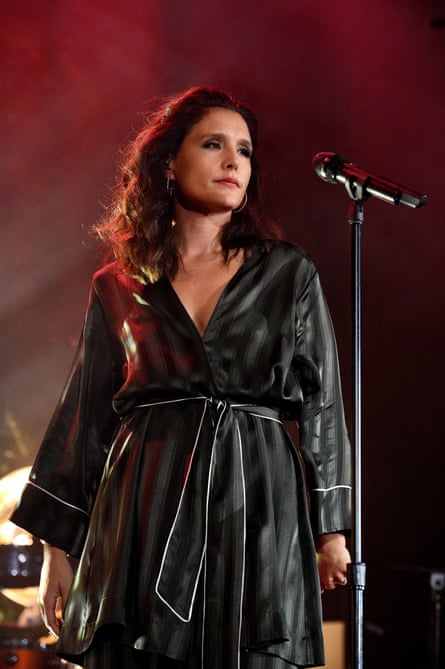The current trend for nightwear as evening wear has all sorts of upsides. “I’m in my pyjamas,” quips Jessie Ware, just a handful of songs into her set, “so I can go straight to bed.” As the crow flies, we are not all that far from her east London home.
Wrapped in elegant satin and shod in checked stilettos, a beaming Ware is surrounded by five band members and a lush, verdant stage setting lit by large, sunflower-like lamps. It’s as redolent of a fashion shoot as it is of electrified music performance. Since her first album, 2012’s Devotion, Ware’s visual signature has been as recherche as her sound. Both exude a sleek, grown-up classicism derived from soul and the age of 80s video-pop: Sade and billowing white curtains, are, metaphorically, never far away.
Hearing Ware again after a two-year absence, however, it’s striking how strong her good songs remain, and also how much just-so filler she has been responsible for. Seemingly insubstantial, Tough Love – the title track of her last album – gets ecstatic, deserved whoops from the crowd on its first notes. It pins Ware as a gossamer 80s stylist, one whose minimalism and vocal restraint add up to a very high-end product. By contrast, an early-set run of songs like Running and No to Love tend towards muzak this evening.
Her maternity leave has also resulted in a brand new album, the forthcoming Glasshouse. A striking new track, Midnight, starts off as a breathless come-hither, then resolves into a 70s soul vamp, injecting a little more oomph into Ware’s glistening catalogue.

Its fellow, Selfish Love, is equally striking, a bossa nova confection that recalls the Cardigans’ 90s hit Lovefool, but not damagingly so. The two songs have been released with a pair of intriguing, linked videos – enigmatic films noir in which Ware slays a boyfriend. (For my money, Midnight is her love song to the housekeeper in the films’ story, with whom Ware might be secretly knocking boots.) Both bode well for Glasshouse.
Although Ware is chatty, the first half of tonight’s performance is uneventful. You always find yourself wishing that all artists would play their entire sets like they play their encores; so few do. In addition, Ware’s inbuilt sophistication has always carried with it the threat of too much maturity – a problem shared with her fellow south London warbler, Adele – and you can’t help but feel that as album three rolls around, Ware might be tipping over into complacency. Wipe-clean songs, delivered elegantly, with just a little shuffling around the mic stand: job done.
By the second half, however, the veneer peels back. Ware wonders aloud whether she can do something “in bad taste”. The mind boggles; GG Allin, a punk performer who used to do unspeakable things with bodily substances, springs to mind.
In the end, Ware just asks the crowd to put their phones down, and demands her band play her set opener, Midnight, again. This small outbreak of spontaneity results in an even slinkier version; you suspect Ware is actually proud of that song. Soon after, Ware asks the crowd for a hairband to put up her long hair, “sopping” with sweat. In the effort, one of her stilettos falls off. Instead of fighting to put it back on, Ware kicks off the other one and pads about the front of the stage, barefoot, before sitting on a monitor.
She really does look ready for bed, but the result is a charged intimacy for the final pair of very different songs. Wildest Moments is vintage Ware: she is gutsy and bittersweet, trying to find the stable ground in an extreme relationship.
The final song is a new one and “important to her”. It’s a love song to several people: Ware’s partner, Sam, after whom it is named, their baby girl and her own mother. Ed Sheeran’s co-writing credit is audible in the song’s stripped-down sensibility, a marked divergence from all the monochrome synthetics that have held sway for two albums. Whereas before, Ware’s songs tended to be generalised paeans to tortured love, now, Sam finds her wondering what sort of a mother she will be. There’s admiration for her own mother’s bravery, and a line that casts her own father in a dim light. It’s a paradigm shift that gets a standing ovation.

Comments (…)
Sign in or create your Guardian account to join the discussion